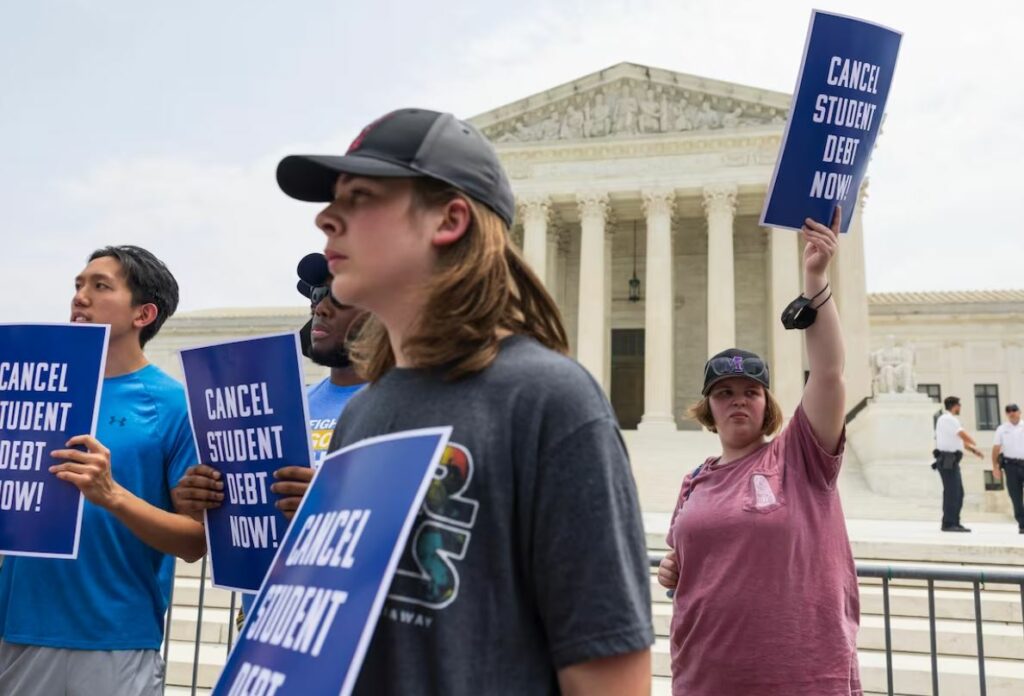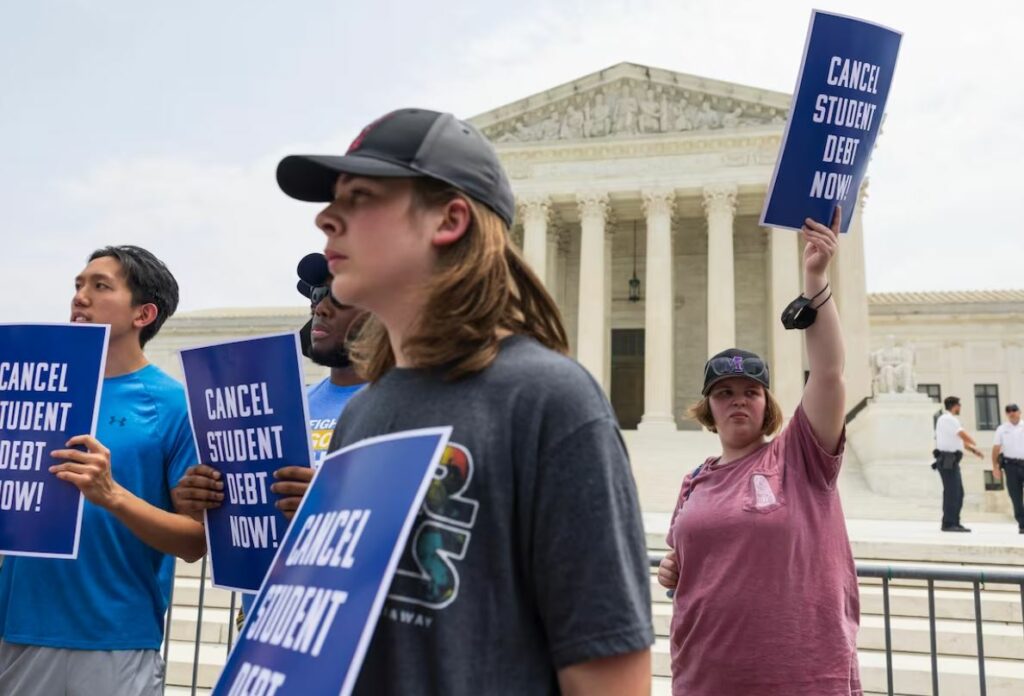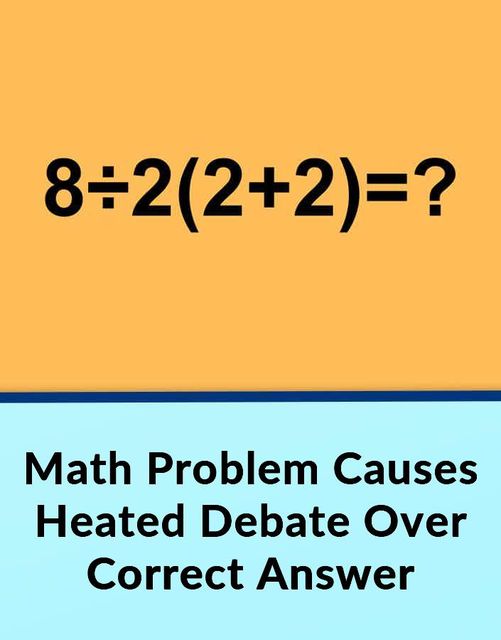The Supreme Court declared on Friday that President Biden lacks the authority to carry out his roughly $400 billion proposal to forgive student loan debt, dealing another blow to the administration’s audacious claims of power. This was the court’s final decision of its term.
By late afternoon, Biden had declared a “new path” for loan forgiveness and begun a lengthy federal regulation procedure. He also made plans for a 12-month “ramp” in student debt repayment that would be transitory.
By this scheme, borrowers who skip loan payments will not be reported to credit bureaus for 12 months, according to Biden, “to give them a chance to get back up and running.”
In remarks at the White House, Biden vowed never to stop fighting for the country. “We’ll employ every available means to achieve your goals and secure the student debt relief you require. It benefits both the nation and the economy.

The speedy response brought attention to the political stakes involved and likely indicated that the White House was concerned the Supreme Court would not approve the comprehensive program.
The case brought together several contentious issues, including an ambitious plan to fulfill a promise made to Biden’s political base during the campaign, increased skepticism by the court’s conservative supermajority regarding the ability of federal agencies to act without express congressional authorization, and the ability of Republican-led states to use the judiciary to thwart a president’s priorities before they are implemented.
Up to 40 million borrowers would have been impacted by Biden’s policy, with roughly half qualifying to have their loan sums forgiven. Loan payments have been put on hold due to the coronavirus outbreak, but they will start up again this fall. Along ideological lines, the program was overturned by a 6-3 vote, with conservative Chief Justice John G. Roberts Jr. voting in favor of the majority.
According to Biden, the Higher Education Relief Opportunities for Students Act of 2003 gave his administration the power to forgive student loan debt. In a national emergency, such as the pandemic, that statute permits the education secretary to waive or alter loan requirements.
However, the majority claimed that Miguel Cardona’s plan for education relied on an “exhaustive rewriting” of the law.
“The Secretary claims he can waive $430 billion in student loan principal under the HEROES Act. It doesn’t,” wrote Roberts. “We hold today that the Act permits the Secretary to ‘waive or modify’ existing statutory or regulatory provisions applicable to financial assistance programs under the Education Act, not to rewrite that statute from the ground up,” the court wrote in its ruling.
Justices Clarence Thomas, Samuel A. Alito Jr., Neil M. Gorsuch, Brett M. Kavanaugh, and Amy Coney Barrett joined Roberts on the bench.
For borrowers making up to $125,000 per year, or up to $250,000 for married couples, Biden and Cardona’s proposal would remove up to $10,000 in college debt. Forgiveness of an additional $10,000 would be available to students who obtained Pell Grants, a type of financial help for low- and middle-income students.
In support of the program during oral arguments, U.S. Solicitor General Elizabeth B. Prelogar claimed that Cardona’s activities were legal and exactly what Congress had in mind when passing the Heroes Act in the wake of the 9/11 terrorist attacks.
Three liberal judges on the court concurred.
Justice Elena Kagan dissented from the majority view and claimed that the judiciary was replacing Congress and the executive branch in determining national policy.
With Justices Sonia Sotomayor and Ketanji Brown Jackson, Kagan wrote, “Congress authorized the forgiveness scheme (among many other measures); the Secretary put it in place; and the President would have been accountable for its success or failure.
However, this Court today rules that about 40 million Americans will not be eligible for the benefits offered by the plan because, in the words of the Court, the aid is “too significant.”
In an incorrect move, Biden claimed, the court removed “the lifeline tens of millions of hardworking Americans needed as they try to recover from a once-in-a-century pandemic.”
The president issued a statement criticizing Republican elected officials for their astounding hypocrisy. They had no issues with the billions of dollars in loans made to businesses in response to the pandemic, including thousands and even millions of dollars for their companies. And those debts were discharged.
The court has previously rejected the administration’s broad justifications. The court has repealed the eviction ban imposed by the Centers for Disease Control and Prevention during the pandemic era.
It invalidated the Occupational Safety and Health Administration’s requirement for major companies to vaccinate employees or test them for the coronavirus. Additionally, it used the “major questions” doctrine to restrict the Environmental Protection Agency’s choices for addressing climate change in a decision unconnected to the pandemic.
In one case, six Republican-led states challenged the student loan program, while in another, two Texans did the same. The Justice Department questioned whether the plaintiffs in both cases had the right to bring their claims to court. However, the court determined that Missouri had standing to file the lawsuit because of a state-created entity dealing with student loans, thus rejecting the Texas argument.
A rival state’s attorney general, Mike Hilgers of Nebraska, claimed that the court had “stopped the Biden Administration’s breathtaking attempt to grab power.” According to Hilgers, the decision is a “welcome reminder that the President is not a king. He must cooperate with Congress rather than avoid it.
Kagan claimed that her fellow conservatives struggled to find a reason not to support Biden’s proposal.
The majority “reaches out to decide a matter it has no business deciding in adjudicating Missouri’s claim,” she wrote. It breaches a legal barrier designed to prevent judges from acting arbitrarily.
Roberts responded to the criticism swiftly and appeared to be attentive to it.
He argued that criticizing rulings that people disagree with as going beyond the proper responsibility of the judiciary had become a troubling trend in certain recent opinions. “We do not interpret this blatantly sincere disagreement as denigration. Neither the public nor the media must get misled. Any such misunderstanding would be detrimental to this organization and our nation.
According to Roberts, the majority “employed the traditional tools of judicial decisionmaking” in concluding that the administration was abusing the Heroes Act’s ambiguous language to carry out a scheme that Congress would surely not approve.
“The Secretary has expanded forgiveness to nearly every borrower in the country, from a few narrowly delineated situations specified by Congress,” Roberts wrote. The cited provisions have only been “modified” by the Secretary’s plan in the same way that “the French Revolution “modified” the status of the French nobility”—they have been completely replaced by a new system.
Roberts quoted a passage from the late Justice Antonin Scalia’s separate opinion in the Supreme Court.
In fact, there was a time when Biden and other Democratic leaders questioned whether the law allowed for such flexibility. Nancy Pelosi (D-Calif.), a former House speaker, was quoted by Roberts as saying this.
Additionally, Capitol Hill has been divided over Biden’s debt relief package. The president vetoed a Republican-led proposal to repeal the program and resume loan payments for tens of millions of borrowers on June 7. Sens. Joe Manchin III (D-W.Va.), Jon Tester (D-Mont. ), and Kyrsten Sinema (I-Ariz.) supported the legislation, which helped it pass the Senate. This shows how challenging it will likely be to pass any additional debt relief legislation in the future.
Mitch McConnell, the Republican minority leader in the Senate, applauded the court’s decision on Friday. “The American people know that the Biden Administration’s student loan socialism plan would be a raw deal for hardworking taxpayers,” he claimed. “They can know that it’s illegal now that the Supreme Court has rejected the Administration’s position in Biden v. Nebraska,” the judge said.
The administration’s greatest chance of winning before the Supreme Court was to persuade the judges that none of the challengers had suffered harm as a result of the program and lacked standing to file a lawsuit.
In order to be granted relief from a federal court, challengers must establish that they have experienced a specific injury as opposed to a broad one. Simply criticizing the program’s scope or even asserting that the president had overstepped his bounds was insufficient.
The Missouri Higher Education Loan Authority, a mostly independent organization, could suffer losses from Biden’s proposal, which would damage Missouri, one of the challenged states, according to a panel of the U.S. Court of Appeals for the 8th Circuit. A second court determined that Myra Brown and Alexander Taylor, the two borrowers, lacked standing to continue because Taylor was not eligible for the full $20,000 in forgiveness, but Brown was.
The court dismissed the individuals’ lawsuit in a unanimous decision, stating that they lacked standing to bring it.
But Roberts asserted that Missouri’s challenge might go forward. In his letter, he claimed that “the Secretary’s plan hurts MOHELA in the discharge of its public function and, consequently, directly hurts the State that created and controls MOHELA.” Thus, Missouri “has been harmed to the extent that it has standing to challenge the Secretary’s plan.”
Kagan claimed that in trying to establish legal standing, the majority had gone too far. Does anyone in America believe Missouri is present because it is concerned about losing loan-servicing fees to MOHELA? I want to meet him,” she penned. She countered that Missouri and the other states had come to court because they believed Biden had established a harmful policy.
But this Court does not convene to decide that issue, she continued.
On the merits, Kagan and her four dissenters claimed that Biden and President Donald Trump-shaped loan repayment moratoria using the law’s expansive phrasing. SHE WROTE THAT the HEROES Act was created to address such crises, which are frequently enormous in scale and unanticipated in character.
She pointed out that the majority criticized the initiative’s scope and raised issues with executive authority. Thus, Kagan said, “The Court substitutes itself for Congress and the Executive Branch — and the hundreds of millions of people they represent — in making this Nation’s most crucial and contentious policy decisions.”
Millions of people who have student loan debt are in limbo due to the legal disputes. Before the program’s suspension by the courts, more than half of eligible students had applied, with the Education Department approving over 16 million of those applications.
Sinyetta Hill, 22, who recently graduated from the University of Wisconsin, could not apply since the department shut down the application process. Still, she remained optimistic that the court would maintain Biden’s program.
She would have qualified for the full $20,000 in student loan forgiveness as a Pell Grant winner. As she gets ready to apply to law school and take on even more debt this fall, she will have to begin making payments on that total.
Hill, who graduated with a bachelor’s degree in political science and philosophy this spring, said, “It’s devastating because I had so much optimism that this decision would go through.” “Students today, including myself, are still in a rut.”
The debt relief judgment was made a day after the court declared affirmative action admissions procedures unlawful. According to student advocates, both decisions would reverse equality gains for Black students.
The limitations on affirmative action may make it more challenging for Black students to enroll in selective universities, many of which provide generous financial aid to help them avoid taking out loans. In contrast, if the debt cancellation plan is rejected, Black borrowers, who bear a disproportionate amount of student loan debt, will be denied the opportunity to reduce their debt load.
Black, Brown, and other minorities access to prosperity has been significantly hampered by the Supreme Court in the last 24 hours, according to Chavis Jones, associate counsel with the Lawyers Committee for Civil Rights Under Law.
We must ensure that [these] students have equal access to higher education institutions and economic prosperity after graduation.
The cases are U.S. Department of Education v. Brown and Biden v. Nebraska.





